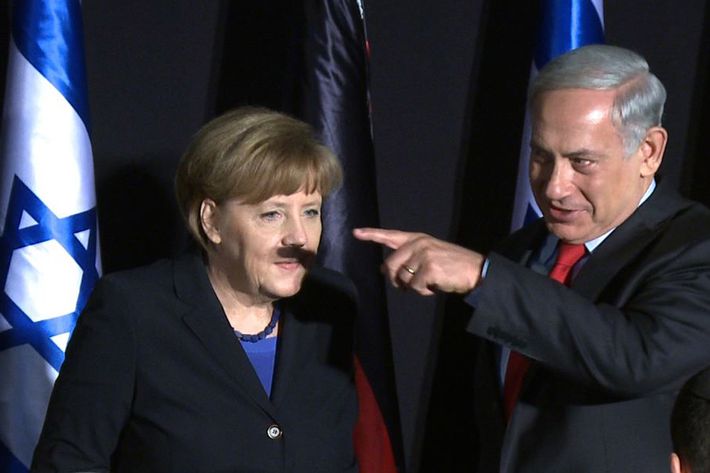
The defining trait of neoconservative thought is analogizing all foreign-policy scenarios to the rise of Hitler, thereby turning every question into a simple Chamberlain-or-Churchill decision matrix in which the correct answer is always Churchill. I have now read Wall Street Journal columnist Daniel Henninger’s column today some half-dozen times in a futile attempt to identify a central thesis. None can be found, except a free association linkage between the modern foreign-policy landscape and Europe in 1938. It is just this lack of defined argument that makes Henninger’s latest column such a valuable tool in studying the neoconservative psyche. Stripped of any pretense to prescriptive analysis or specific policy goals, Henninger has instead opened a window into the underlying pathology of his worldview. Reading the column is like listening to Dick Cheney mutter in his sleep.
Henninger’s hook for the column is the 100th anniversary of the start of World War I, which is his cue for an artless transition to the war he really wants to talk about:
The revisiting of this dark history may be why so many people today are asking if our own world—tense or aflame in so many places—resembles 1914, or 1938.
Whatever the answer, it is the remembering of past mistakes that matters, if the point is to avoid the high price of re-making those mistakes.

What if the answer is that the world doesn’t resemble 1938? (Or even 1914?) Never mind — of course it does, because it always does:
In 1938, British Prime Minister Neville Chamberlain, not unlike John Kerry today, shuttled tirelessly between London and wherever Adolf Hitler consented to meet him.
Kerry is traveling to different cities to hold negotiations — just like Neville Chamberlain. What’s even worse, his apparent goal in these negotiations is to prevent violence:
One may hope Mr. Kerry and President Obama have more success with their stop-the-violence missions to Vladimir Putin, Kiev, Gaza, Iraq, Syria, Tehran, Afghanistan and the South China Sea than Neville Chamberlain had with Hitler.
The disturbing implication of Henninger’s argument is that Obama should not be negotiating with these people, and should instead be forcing them to back down, or simply rolling over them with actual military force. I would like him to at least outline how the U.S. could be expected to fight or threaten simultaneous wars with Russia, Hamas, ISIS, Syria, Iran, Afghanistan, and China. Even taking all the Muslims out of the equation and just fighting Russia and China at the same time seems pretty ambitious.

Perhaps sensing that the magnitude of the task before us may be weakening the martial resolve of the audience, Henninger returns to his history lesson:
But here’s the forgotten part. After signing the Munich Agreement on Sept. 29, 1938—an event now reduced to one vile word, appeasement—Chamberlain returned to England in triumph. Many, recalling 1914-18, feared war. Londoners lined the streets to cheer Chamberlain’s deal with Hitler. He was feted by King George VI. At 10 Downing Street, Chamberlain said the words for which history remembers him: “I believe it is peace for our time.”
This is not the “forgotten part.” It’s an extremely famous episode. But Henninger, writing for an audience that has apparently never even flipped through A&E on cable on their way to watching The Shawshank Redemption, explains for us what happened next. SPOILER — it wasn’t peace:
Winston Churchill, in a speech to the House of Commons, dissented: “This is only the first sip, the first foretaste of a bitter cup.” Hitler, as sometimes happens in history, had negotiated in total bad faith, with no interest in anyone’s desire for peace.
The lesson is, never negotiate with anybody.






























